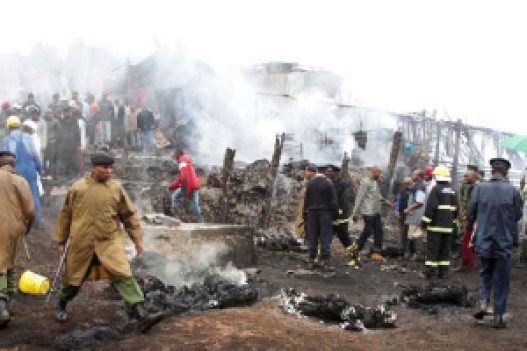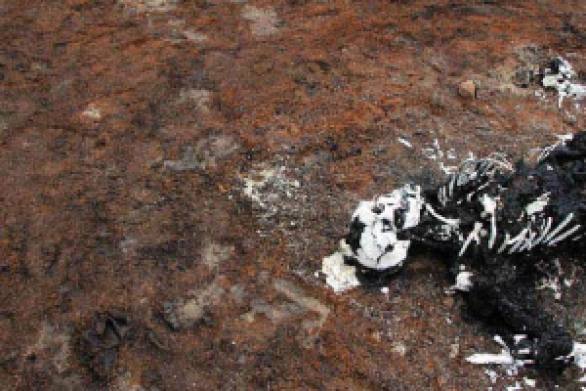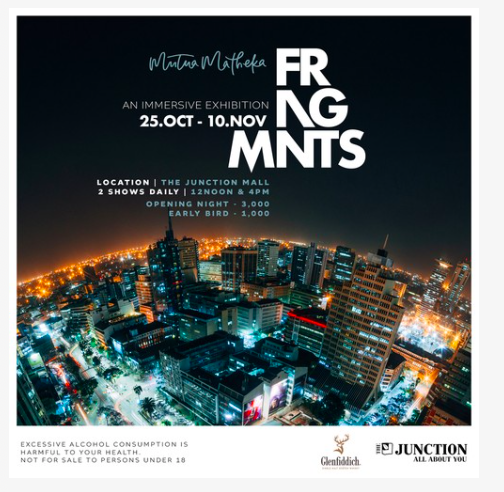…and the story of a woman scorned
Disaster in the city…again.
Same script, new players, same villain.
Something happened yesterday; a fire in a Nairobi slum killed tens of people in the span of a few hours. Media houses were in shock, as was the rest of the country, and they ended up showing extremely graphic pictures, disgusting the good heart of our nation, even those claiming to be tweeting to help.
As someone who has been to a human anatomy laboratory, and around the bodies of the deceased more times than I count, I can tell you for sure that you do not know how you will react until you get there. Instead of whining about our little consciences, it would have been nobler to start organizing counseling services for the hundreds of residents, rescue workers, police officers and most of all journalists who were there all day.
I placed the last as the ‘most important’ for one reason, they had to take photos, and then edit them. At least police officers and rescue workers have counseling services, or an iron armor you develop when disaster strikes too often.
Sad as it is, the fire was prophesied once, two years ago by two budding journalists. They cheekily titled their story (or the editor did, I suspect) The Fire Next Time: Slum Courts Doom. Two Years later, on a rainy, cold Monday morning, doom did accept to be courted, actually it came and took away about a hundred people and ruined others. The fire next time became, well, the fire next time indeed.
The government was frustrated because local MPs would not allow the forceful eviction of residents. Ignorance paid off again, as it did several borders away in Congo where it smouldered about 240 people trying to siphon fuel. Of the three disasters that plagued the Central and East Africa Region, killing over 500 people in two days, two were fuel related, and all were machine failures.
Still, on the bright side, it was not terrorist-related (or self-inflicted) like the attack on the WTC 10 years ago. Now we blame God, the government and poverty.
When someone asked me why I agreed with @machariagaitho when he wrote in this opinion piece that the price of impunity (and in extension, ignorance) had been paid and yet this people were driven there by poverty, I answered using the adage that ‘Ignorance is no defense’. You cannot live on an oil pipeline and not anticipate danger.
Hell, I even mumble a prayer every time I get into a matatu. The saddest thing is that we are a country, and a world, of idealists. I salute the journalist who wrote this, reading was disturbing, even for me. and by the way , just in case you are looking to buy the fuel that survived, read this first.
We want the subjective, sieved details, we want to see edited photos and talk about the disaster. We want photos of the better part, not caring that there is worse happening. We romanticize and we look at disaster subjectively. We act as if disaster is a new thing, and yet it has stuck with humanity all through. Poverty or no poverty, realism has taken a backseat and we are where we are no because we have denied ourselves the truth…
The sight of charred remains, still smoking, the remains of what used to be a human body. The disgusting photos of the half-burned bodies floating in a river, as the people standing on the riverbank hold their chins. Of a slum where one neighbor knows not the other. Where people have died with no identity. It is the greater equalizer, death.
Stalin said that the death of a million is only a statistic, as is the death of a hundred in this case. Even if only one person had died in this fire, it would and should have been a tragedy enough. But the truth is that we have too high a moral sense, unwarranted to begin with, and we sympathies and empathize, and it is a new morning, whats the news?
When I was in college, my financial accounting lecturer told a story about his near-death experience. He was a college student back when the first oil truck overturned near Banana in Kiambu County a little over half a decade ago. As he headed home, he saw the truck and the people getting pails and buckets to get fuel. He joined in; like any other good Kenyan would (I am making an assumption here).
When he had his first bucket full, he ran home to get another and just as he reached a few hundred meters away, the truck exploded. Drenched as he was in oil, he did the first thing his mind told him to do, silly, as it was he ran back. What he saw still haunts him, the one memory of a woman running towards him, like a human frame of fire, screaming and wailing for help. She fell to the ground and started rolling in an attempt to put out the fire, but an oil fire can be an ass.
There is no moral to that story, except where one believes that experience is the best teacher, or the story that is retold after that. Do not misquote me; I know if another truck overturns, or a fuel pipe leaks, people will go to get free fuel.
I believe that the worst disaster is the disaster of human ignorance, that innate ability to refuse to listen to reason because we think the universe knows we are poor, or homeless, or unfed, or rich, or tall, or short, or framed, or justified, or beautiful. I have it, you have it, and it will be the death of us, and death is a good thing, living with the scars is much harder.
ION and on somewhat of a lighter note, Walking with my friend @wambumishi yesterday, we happened upon this leaflets (read printed papers) distributed all over.
Now thats a woman scorned. This I believe is a classic case of the propaganda war, slander her name using all possible jabs. A little advice to women, if he is going out with her, fight him, not her. Then again I know that hit on deaf ears, even the realist in me can not understand why this woman would choose to get this tryped, printed, and distributed.
The last lines are the kind that ‘send a chilly feeling up and down the culprit’s spine’
This is the Beggining
Maraya!!!!
Now my friend and I are arguing about whether Maraya in this case is the woman’s name, nickname, or an insult misplaced. Whichever the case, the four exclamation marks place emphasis on the point.
Owaahh, 2011
One story is good,
till Another is told.
Last modified: February 12, 2020


















